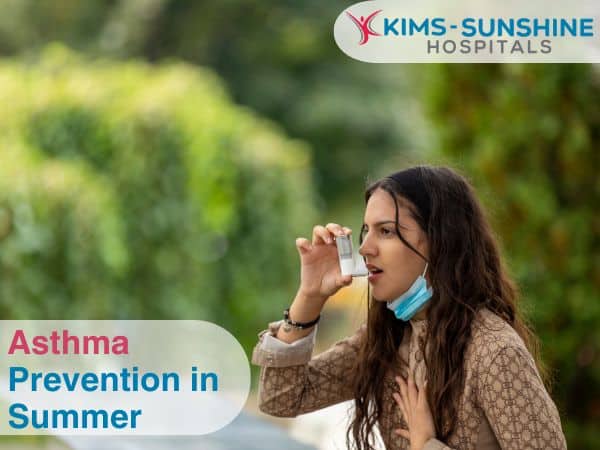
Asthma Prevention in Summer
Managing Asthma During Hot Weather
Summer is meant for carefree fun and relaxation.
But, for those of us with asthma, it is natural to be a little concerned about how the summer heat will affect our Asthma flair-ups!
Because we want you to enjoy this summer without worrying we’ve got you covered with some practical tips that can help you manage your asthma effectively during the summer.
Tips to Reduce Asthma Flare-ups in Summer
We know more than anyone how disruptive and distressing asthma symptoms can be, leaving you struggling to catch your breath.
The good news is that by being informed, you have the power to keep asthma!
Here are a few quick tips to keep in mind:
- Check pollen forecasts before headings outside
- Minimize exposure to common allergens like dust
- Stay away from mold by keeping windows closed and using air conditioning
- Maintain good indoor air quality by regularly cleaning and vacuuming
- Avoid dry mopping and opt for wet mopping to ensure fine particles don’t accumate in the home
Heat and Humidity
High temperatures and humidity are known to worsen asthma symptoms.
An easy fix for this is to regulate indoor temperature with air conditioning.
For those who don’t have access to air conditioning or prefer a more cost-effective and eco-friendly option, fans can provide a simple and helpful alternative for cooling down indoor spaces. Here are some tips for using fans to manage asthma during hot, humid weather:
- Strategic fan placement: Position fans near open windows or doors to promote cross-ventilation and improved air circulation throughout the room. Aim the fans to blow hot, stagnant air out and draw in cooler air from the outside (when outdoor air quality is good).
- Use multiple fans: Strategically place fans in different areas of the room or house to create a cooling airflow throughout the space.
- Consider evaporative cooling: In dry climates, you can enhance the cooling effect of fans by placing a shallow pan or bowl of cool water in front of the fan. As the air passes over the water, some of it will evaporate, providing a refreshing, moisture-rich breeze.
- Maintain fan cleanliness: Regularly clean and maintain your fans to prevent the accumulation of dust and allergens that could potentially trigger asthma symptoms.
- Combine with other cooling methods: For maximum comfort, use fans in conjunction with other heat-reducing strategies, such as closing blinds or curtains during the hottest parts of the day and minimizing heat-generating activities.
Outdoor Activities and Asthma Control in Summer
While it can be tempting to stay out all day during the summer, it is important to pay attention to your body during the summer.
Engage in outdoor activities early morning or late evening when temperatures are cooler.
Ensure that you don’t overstimulate your body when the summer heat is unmanageable.
Asthma-Friendly Summer Vacation Planning
For those living with asthma, planning a summer vacation requires a little extra thought and preparation, but it’s absolutely possible to have an enjoyable and worry-free getaway. Here are some tips for asthma-friendly summer vacation planning:
Choose Your Destination Wisely
Do your research to find destinations with low pollen levels, minimal air pollution, and a climate that won’t exacerbate your asthma symptoms. Consider locations near the coast or in higher elevations, where pollen and pollution levels tend to be lower. Online resources and travel forums can provide valuable insights from fellow asthma sufferers who have visited different areas.
Investigate Accommodations Thoroughly
Once you’ve narrowed down your destination, take the time to thoroughly vet potential accommodations. Look for hotels, resorts, or vacation rentals that prioritize good indoor air quality and have effective ventilation systems in place. Smoke-free environments are an absolute must, as secondhand smoke can be a major asthma trigger.
Pack Your Asthma Essentials
Before embarking on your trip, ensure you have an ample supply of all necessary medications, inhalers, and any other asthma-related equipment you might need. Pack these items in your carry-on luggage to avoid any potential issues with lost or delayed checked baggage. Don’t forget to bring copies of your updated asthma action plan and emergency contact information as well.
Plan Asthma-Friendly Activities
While on vacation, prioritize activities that are less likely to exacerbate your asthma symptoms. Opt for indoor attractions or outdoor excursions during cooler parts of the day when pollen levels are typically lower. Avoid strenuous activities in extreme heat or humidity, which can trigger asthma attacks. Always have your quick-relief inhaler on hand, just in case.
Stay Vigilant and Flexible
Even with the best planning, asthma can sometimes throw a curveball. Pay close attention to your body’s signals and be prepared to modify your plans if you start experiencing symptoms. Don’t hesitate to seek medical attention if necessary, and have information about local healthcare facilities readily available.
Dealing with Pollen-Induced Asthma in Summer
Monitor pollen counts and avoid outdoor activities during high pollen days. Keep windows closed, use air purifiers, and wear sunglasses and hats when outdoors.
Here are some relevant statistics about asthma in India:
- According to the Global Burden of Disease Study, asthma affects approximately 4% of the Indian population.
- The prevalence of asthma is higher in urban areas compared to rural regions, primarily due to environmental factors such as pollution and allergen exposure.
- Studies suggest that the prevalence of asthma in India has been steadily increasing over the years, particularly among children and young adults.
- Asthma exacerbations often peak during the summer months in India, coinciding with increased levels of air pollution and allergens such as pollen.
- Despite the growing burden of asthma, there is a significant treatment gap in India, with many individuals lacking access to proper diagnosis, medications, and asthma management services.
- These statistics highlight the importance of raising awareness about asthma prevention and management, particularly during the summer months when asthma symptoms can worsen due to various environmental factors.
- Always remember to head to the doctor if your symptoms get out of hand. Timely intervention can save lives!








